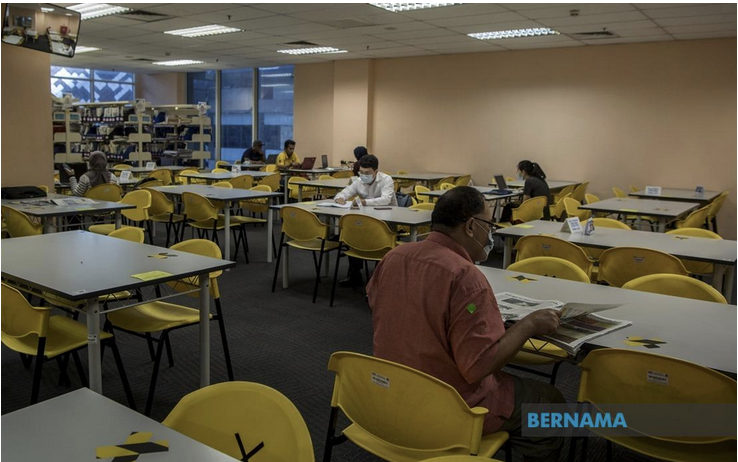ONLINE NEWS: LEADERS ARE READERS
Bernama Thoughts
LEADERS ARE READERS
By Zulkifli Musa | 25 October 2023

Opinions on topical issues from thought leaders, columnists and editors.
By: Zulkifli Musa
Leadership roles come with complex challenges in today’s volatile world. An avid reading habit can provide the knowledge, empathy, and big-picture thinking required to guide teams and organisations successfully. By committing to regular reading, anyone can expand their mindset and capabilities – priming themselves for future leadership opportunities.
Influential Leaders Read
Many of history’s most influential leaders were voracious readers across various genres. Their reading habits helped shape their leadership styles and abilities.
Winston Churchill, the legendary British prime minister during World War II, read prolifically throughout his life. Even in his busy wartime schedule, he set aside time each day for reading. He favoured history books to gain insight from past leaders and biographies to understand what drove great individuals. This habit honed his strategic thinking abilities and inspired his memorable speeches.
Visionary entrepreneur Elon Musk is an avid sci-fi and fantasy reader. He believes reading imaginative fiction expands creativity and pushes boundaries. Growing up, he would read for 10 hours per day. Musk applies this innovative thinking to move technology forward with ground-breaking companies like Tesla and SpaceX.
Billionaire and philanthropist Bill Gates reads about fifty books per year, covering diverse topics like history, business, science, and healthcare. He believes reading is vital to learning new things and fuelling curiosity. Gates’ reading helps drive his philanthropy, where he tackles global issues that many books enlightened him on, like poverty and disease.
While their reading materials spanned biography, fiction, history, and more, these influential leaders used books to open their minds. Their reading habits demonstrate that a passion for books correlates with success. For aspiring leaders, developing a reading habit can provide knowledge, empathy, creativity, and strategic thinking abilities.
The Impact of Books on Leadership Skills
Books can be powerful tools for developing the critical skills needed for effective leadership. Books expose readers to new ideas, perspectives, and frameworks, helping to strengthen critical thinking as leaders learn to carefully analyse information, challenge assumptions, and consider issues from multiple standpoints. Books provide opportunities to think deeply about complex topics, whether a novel or non-fiction. In particular, reading divergent viewpoints expands one’s ability to anticipate potential issues and examine solutions from all angles – crucial skills for strategic leadership.
Reading builds empathy by allowing leaders to enter different worlds and understand varied emotions and motivations. Fictional stories let readers connect with characters on an emotional level, while biographies provide glimpses into the lives of real people.
This exposure to diverse mindsets and experiences helps enhance a leader’s emotional intelligence (EQ). With stronger EQ, leaders can better relate to colleagues, unify teams, and make thoughtful decisions.
Both fiction and non-fiction books provide ample examples of how others have navigated complex scenarios and dilemmas. Immersing in books allows readers to reflect on real-world situations and learn to analyse options better, weigh trade-offs, and make sound calls amidst ambiguity.
Additionally, reading keeps leaders well-informed across disciplines, providing the broad knowledge base needed for visionary strategic thinking and planning.
With sharper critical thinking, emotional intelligence, and decision-making abilities cultivated through reading, leaders gain skills to guide organisations to new heights.
Why Leaders are Readers: Unpacking the Connection
Leaders who read extensively are exposed to diverse ideas, cultures, and viewpoints. Books allow leaders to analyse complex issues from multiple standpoints critically. As they read, leaders learn to think more logically, question assumptions, and develop reasoned arguments. These critical thinking abilities help leaders objectively evaluate ideas and devise innovative solutions to problems.
Fiction, in particular, enables leaders to put themselves in others’ shoes. Leaders gain a deeper understanding of human psychology and emotions by reading about characters from various walks of life. The genre fosters empathy and emotional intelligence, critical skills for inspiring and leading teams.
Reading exercises the creative centres of the brain. It allows the mind to wander, make new associations, and see things in novel ways. Additionally, it sparks leaders’ imagination and ingenuity, helping them develop visionary ideas. Creativity is vital for trailblazing leaders.
Extensive reading expands leaders’ vocabulary and enhances their written and verbal communication abilities. Well-read leaders can articulate complex ideas clearly and persuasively, aiding in delivering inspiring speeches, crafting compelling narratives, and promoting their vision.
Conclusion
Reading helps leaders broaden their perspectives and prevent narrow-minded thinking. It exposes them to diverse ideas, cultures, and viewpoints, allowing them to step into different worlds and see things from fresh angles. This expanded worldview enables leaders to make more informed decisions and devise innovative solutions.
Leaders can continuously expand their knowledge, perspectives, and capabilities by making reading a consistent habit. A passion for books and other reading materials sows the seeds for growth into a visionary leader.
-- BERNAMA
Zulkifli Musa is a Senior Publications Officer with Universiti Sains Malaysia.
- Created on .
- Hits: 401
